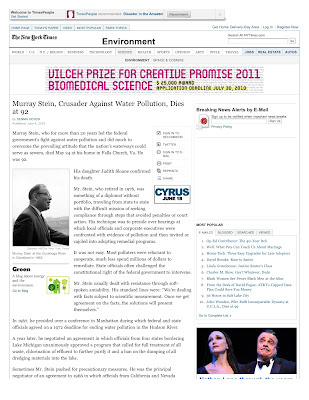He did some great work. We've fixed a lot of the big problems that had our streams running with sewage and industrial waste. Who is our champion for the accumulation of effects from uncounted "nonpoint" pollution sources across our country side? Who is the champion for the groundwater?
The New York Times
By DENNIS HEVESI
Published: June 4, 2010
Murray Stein, who for more than 20 years led the federal government’s fight against water pollution and did much to overcome the prevailing attitude that the nation’s waterways could serve as sewers, died May 24 at his home in Falls Church, Va. He was 92.
His daughter Judith Sloane confirmed his death.
Mr. Stein, who retired in 1976, was something of a diplomat without portfolio, traveling from state to state with the difficult mission of seeking compliance through steps that avoided penalties or court action. His technique was to preside over hearings at which local officials and corporate executives were confronted with evidence of pollution and then invited or cajoled into adopting remedial programs.
It was not easy. Most polluters were reluctant to cooperate, much less spend millions of dollars to remediate. State officials often challenged the constitutional right of the federal government to intervene.
Mr. Stein usually dealt with resistance through soft-spoken amiability. His standard lines were: “We’re dealing with facts subject to scientific measurement. Once we get agreement on the facts, the solutions will present themselves.”
In 1967, he presided over a conference in Manhattan during which federal and state officials agreed on a 1972 deadline for ending water pollution in the Hudson River.
A year later, he negotiated an agreement in which officials from four states bordering Lake Michigan unanimously approved a program that called for full treatment of all waste, chlorination of effluent to further purify it and a ban on the dumping of all dredging materials into the lake.
Sometimes Mr. Stein pushed for precautionary measures. He was the principal negotiator of an agreement in 1966 in which officials from California and Nevada approved an unusual engineering program to prevent pollution of Lake Tahoe, one of the world’s clearest bodies of water. As federal authority over water-pollution control was reorganized and transferred from one agency to the next between 1955 and 1971, Mr. Stein also made the shifts: from the Public Health Service to the Department of Health, Education and Welfare to the Department of the Interior and to the Environmental Protection Agency.
William D. Ruckelshaus, the first E.P.A. administrator, depended on him. In a 2005 profile of Mr. Ruckelshaus, The Journal of Leadership & Organizational Studies, said, “In the course of his travels, Murray Stein had learned where all the worst water pollution problems were, and when Bill Ruckelshaus wanted to move out with an aggressive enforcement program, Murray could tell him where to begin.”
Born in Brooklyn on Oct. 16, 1917, Mr. Stein was one of two children of Leonard and Mary Newmark Stein. His father was a food distributor to grocery stores, his mother a clerk at Macy’s. Mr. Stein studied at City College of New York for two years before moving to Washington. During World War II, he served as a medic in the Army.
After the war, while completing his bachelor’s degree at George Washington University, and earned his law degree there in 1949.
Mr. Stein’s wife of 65 years, the former Anne Kopelman, died in 2005. Besides his daughter Judith, he is survived by another daughter, Toby Mullvain, and two grandchildren.
Not all of Mr. Stein’s dealings with local officials were amiable.
In 1969, he was aboard a boat inspecting the Passaic River in New Jersey when it ran aground on putrid muck lining the river bottom. The boat was soon freed, but an argument ensued. “This is not a pristine, babbling brook,” a state official told Mr. Stein. “This is an industrial river.”
“Industrial river is a euphemism for open sewer,” Mr. Stein replied, adding that the river was “a disgrace to the United States.”
